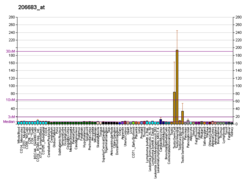Zinc finger protein 165
Appearance
(Redirected from ZNF165)
| ZNF165 | |||||||||||||||||||||||||||||||||||||||||||||||||||
|---|---|---|---|---|---|---|---|---|---|---|---|---|---|---|---|---|---|---|---|---|---|---|---|---|---|---|---|---|---|---|---|---|---|---|---|---|---|---|---|---|---|---|---|---|---|---|---|---|---|---|---|
| Identifiers | |||||||||||||||||||||||||||||||||||||||||||||||||||
| Aliases | ZNF165, CT53, LD65, ZSCAN7, zinc finger protein 165 | ||||||||||||||||||||||||||||||||||||||||||||||||||
| External IDs | OMIM: 600834; HomoloGene: 122143; GeneCards: ZNF165; OMA:ZNF165 - orthologs | ||||||||||||||||||||||||||||||||||||||||||||||||||
| |||||||||||||||||||||||||||||||||||||||||||||||||||
| |||||||||||||||||||||||||||||||||||||||||||||||||||
| |||||||||||||||||||||||||||||||||||||||||||||||||||
| |||||||||||||||||||||||||||||||||||||||||||||||||||
| Wikidata | |||||||||||||||||||||||||||||||||||||||||||||||||||
| |||||||||||||||||||||||||||||||||||||||||||||||||||
Zinc finger protein 165 is a protein that in humans is encoded by the ZNF165 gene.[3][4]
Function
[edit]This gene encodes a member of the Kruppel family of zinc finger proteins. Members of this DNA-binding protein family act as transcriptional regulators. This gene is located within a cluster of zinc finger family members. The encoded protein may play a role in spermatogenesis.[4]
Interactions
[edit]Zinc finger protein 165 has been shown to interact with Ewing sarcoma breakpoint region 1[5] and DVL2.[5]
See also
[edit]References
[edit]- ^ a b c GRCh38: Ensembl release 89: ENSG00000197279 – Ensembl, May 2017
- ^ "Human PubMed Reference:". National Center for Biotechnology Information, U.S. National Library of Medicine.
- ^ Tirosvoutis KN, Divane A, Jones M, Affara NA (Jan 1996). "Characterization of a novel zinc finger gene (ZNF165) mapping to 6p21 that is expressed specifically in testis". Genomics. 28 (3): 485–90. doi:10.1006/geno.1995.1178. PMID 7490084.
- ^ a b "Entrez Gene: ZNF165 zinc finger protein 165".
- ^ a b Rual JF, Venkatesan K, Hao T, Hirozane-Kishikawa T, Dricot A, Li N, Berriz GF, Gibbons FD, Dreze M, Ayivi-Guedehoussou N, Klitgord N, Simon C, Boxem M, Milstein S, Rosenberg J, Goldberg DS, Zhang LV, Wong SL, Franklin G, Li S, Albala JS, Lim J, Fraughton C, Llamosas E, Cevik S, Bex C, Lamesch P, Sikorski RS, Vandenhaute J, Zoghbi HY, Smolyar A, Bosak S, Sequerra R, Doucette-Stamm L, Cusick ME, Hill DE, Roth FP, Vidal M (Oct 2005). "Towards a proteome-scale map of the human protein–protein interaction network". Nature. 437 (7062): 1173–8. Bibcode:2005Natur.437.1173R. doi:10.1038/nature04209. PMID 16189514. S2CID 4427026.
Further reading
[edit]- Lee PL, Gelbart T, West C, Adams M, Blackstone R, Beutler E (1997). "Three genes encoding zinc finger proteins on human chromosome 6p21.3: members of a new subclass of the Kruppel gene family containing the conserved SCAN box domain". Genomics. 43 (2): 191–201. doi:10.1006/geno.1997.4806. PMID 9244436.
- Paoloni-Giacobino A, Kern I, Rumpler Y, Djlelati R, Morris MA, Dahoun SP (2001). "Familial t(6;21)(p21.1;p13) translocation associated with male-only sterility". Clin. Genet. 58 (4): 324–8. doi:10.1034/j.1399-0004.2000.580411.x. PMID 11076058. S2CID 19063057.
- Rual JF, Venkatesan K, Hao T, Hirozane-Kishikawa T, Dricot A, Li N, Berriz GF, Gibbons FD, Dreze M, Ayivi-Guedehoussou N, Klitgord N, Simon C, Boxem M, Milstein S, Rosenberg J, Goldberg DS, Zhang LV, Wong SL, Franklin G, Li S, Albala JS, Lim J, Fraughton C, Llamosas E, Cevik S, Bex C, Lamesch P, Sikorski RS, Vandenhaute J, Zoghbi HY, Smolyar A, Bosak S, Sequerra R, Doucette-Stamm L, Cusick ME, Hill DE, Roth FP, Vidal M (2005). "Towards a proteome-scale map of the human protein–protein interaction network". Nature. 437 (7062): 1173–8. Bibcode:2005Natur.437.1173R. doi:10.1038/nature04209. PMID 16189514. S2CID 4427026.
External links
[edit]- ZNF165+protein,+human at the U.S. National Library of Medicine Medical Subject Headings (MeSH)
This article incorporates text from the United States National Library of Medicine, which is in the public domain.



